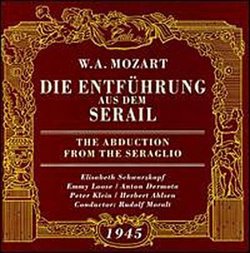| All Artists: Wolfgang Amadeus Mozart, Karl Böhm, Mário Rossi, Rudolf Moralt, Austrian Radio Symphony Orchestra, Turin RAI Orchestra, Vienna Philharmonic Orchestra, Elisabeth Schwarzkopf, Emmy Loose, Anton Dermota, Peter Klein Title: Mozart: Die Entführung aus dem Serail Members Wishing: 0 Total Copies: 0 Label: Gala Release Date: 6/6/2000 Genre: Classical Styles: Opera & Classical Vocal, Historical Periods, Classical (c.1770-1830), Modern, 20th, & 21st Century Number of Discs: 2 SwapaCD Credits: 2 UPC: 675754381523 |
Search - Wolfgang Amadeus Mozart, Karl Böhm, Mário Rossi :: Mozart: Die Entführung aus dem Serail
 | Wolfgang Amadeus Mozart, Karl Böhm, Mário Rossi Mozart: Die Entführung aus dem Serail Genre: Classical
|
Larger Image |
CD DetailsSimilar CDs |
CD ReviewsA must-have for lovers of Mozart's best neglected opera sieglein@aol.com | Maryland, USA | 05/17/1999 (4 out of 5 stars) "This historical recording of Mozart's most technically difficult opera will change your mind about its standing as one of his greatest. If you've suffered through endless bad recordings of Die Entfuhrung performed by inept interpreters, this will be a revelation. Because of its age (recorded in 1945) you will wish the sound quality of the orchestral and choral numbers were a little clearer, but the arias and ensembles are just fine, and the splendid art of the performance shines through. It is well worth the purchase just to hear Anton Dermota's mastery--probably the best Belmonte in recorded history. Instead of following tradition by playing the role heroically, he interprets the words and music correctly by highlighting the character's sensitivity and sweetness. Elisabeth Schwartzkopf flounders a little on her high C in "Martern aller Arten," but the rest of her work shows an intelligent, brilliant understanding of the role and is thoroughly enjoyable. Emmy Loose as Blonde also gives a notable performance. The Osmin and Pedrillo could be much better, but you will be glad to have this CD just for the others. The low cost is a particular bonus. It is recorded without the recitatives--just straight, glorious music, and has no libretto. Also absent is Constanze's first aria, "Ach ich liebte," but Traurigkeit" is so good you'll never miss it. The bonus tracks from Cosi Fan Tutte and Die Zauberflote are also outstanding. Unlike performers today who seem to be lacking insight into the heart and soul of Mozart, the principal soloists of this recording truly understand--and love--this music, and to the listener it will be readily apparent. Though sometimes a little quirky and requiring a second and third hearing to fully grasp the profundity of the artistry, this is a first-rate, endearing version of Die Entfuhrung." Mozart by the Mozarteans for the Mozarteans L. E. Cantrell | Vancouver, BC Canada | 01/29/2001 (5 out of 5 stars) "In general, I agree with the previous reviewer. The voices are well-recorded but the orchestra is a little compressed and muddy by current DDD standards, although remarkably good for 1945. The opera heaps fiendish difficulties on the lead soprano and tenor. In Act II, the voice of Constanze is carpet bombed by almost a quarter of an hour of brilliant and difficult coloratura warbling with only a short orchestral interlude in the middle to regain her breath. Belmonte has one long, long piece of vocal pyrotechnics after another.Elizabeth Schwartzkopf does a fine job. Yes, she bobbles a note-but even great Homer and Jove occasionally nod. Anton Dermota is the star of the set, undoubtedly the Mozart tenor of the recording era. He did not have the prettiest voice on record, nor the longest breath control, but he was simply right in every thing he did. As a singing performer, he is matched only by Maria Callas and Tito Gobbi, very rarified company, indeed. Here, his voice is well caught. The man sang Mozart as nearly perfectly as any mortal is likely to do. What a pity that his active singing career did not extend into the digital era so that the orchestra could be matched to the near-perfection of the singer. Emmy Loose, as always, does with seeming ease what Mozart asks of her. One cannot give higher praise. She is particularly amusing when she follows Osmin down into the basso-profundo depths.I cannot agree on the smaller parts. Pedrillo, the second tenor is a clown. I am not particularly upset to hear a clown part sung by a man who sounds very like Eddie Cantor, the old vaudeville and radio comedian. He sings that lovely, but unregarded gem in Act III, "In Mohrenland", very well. Osmin is sung by Herbert Almen, a woefully under-recorded performer who seems to have been a reliable house basso all over Germany in the years straddling World War II. In every performance of the Serail that I have seen, the weak link has always been Osmin (not Constanze). On this recording, Almen is a true bass who produces controlled and focused sound from the top to the bottom of his range-providing us with a performance rather than a gargle. In the recital portion of the disc he gives a very clean-sounding aria from Die Zauberfloete which, to my astonishment, I found I preferred to outings by Greindl and Hotter.The recital portion of the CD showcases pieces from Cosi fan Tutte and Die Zauberfloete by Schwartzkopf, Dermota and Almen. It is a nice little benefit and almost makes up for the failure to record Constanze's Act I aria. I suppose this omission must reflect some standard performance cut of the era, although I cannot imagine why it should have been done."
|

 Track Listings (15) - Disc #1
Track Listings (15) - Disc #1